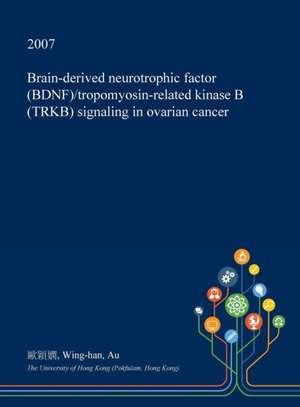Brain-Derived Neurotrophic Factor (Bdnf)/Tropomyosin-Related Kinase B (Trkb) Signaling in Ovarian Cancer
Creat de 歐穎嫻 Autor Au, Wing-Hanen Limba Engleză Hardback
Abstract:
Abstract of thesis entitled BRAIN-DERIVED NEUROTROPHIC FACTOR (BDNF)/TROPOMYOSIN-RELATED KINASE B (TRKB) SIGNALING IN OVARIAN CANCER
Submitted by AU Wing Han For the degree of Master of Philosophy at the University of Hong Kong August 2007
Ovarian cancer is the sixth most common cancer in women and the most fatal gynaecological cancer worldwide. Its high mortality is mainly due to its often late diagnosis at advanced stage. The causes and progression mechanisms of ovarian cancers are uncertain. Epidemiology-based incessant ovulation and gonadotropin theories were the two most popular theories for the explanation of ovarian cancer development. However, there were still a lot of controversies about the two theories. Recently, studies on the roles of growth factors on ovarian carcinogenesis have been reported. It is plausible that growth factors which are supposed to be important for the normal maintenance and development of the ovary might also contribute to the progression of ovarian cancer in association with other risk factors.
In this project, we aimed at studying the effects of the brain-derived neurotrophic I factor (BDNF)/tropomyosin-related kinase (TrkB) signaling pathway on development of ovarian cancer. TrkB is a preferred receptor of BDNF which is a secretory peptide growth factor belonging to the neurotrophin family. This pathway is active in nervous system and is important for normal neural functioning and development. However, this pathway is also important in the development of cancers like neuroblastoma.
Our study demonstrated a higher expression of TrkB protein in invasive ovarian carcinoma and borderline tumours compared to the benign tumors (p
We have found that exogenous BDNF could increase the phosphorylation of TrkB in ovarian cancer cell line, OVCA420, and increase the activation of downstream pathways, mitogen-activated protein kinase (MAPK) and phosphatidyl inositol-3-kinase (PI3K)-Akt pathways. Exogenous BDNF also significantly increased cancer cell motility and invasiveness.
To characterize the functions of TrkB in ovarian cancer, we studied the effect of TrkB silencing (siRNA) in ovarian cancer cells. Silencing of TrkB significantly reduced cell proliferation, increased cell apoptosis and decreased cell migration in ovarian cancer cell line. It also diminished the activation of MAPK and PI3K/Akt pathways as well as reducing the expression of E-cadherin and vascular endothelial growth factor (VEGFR-2). These may imply a possible role of TrkB on cancer metastasis.
II To elucidate the mechanism of TrkB upregulation in ovarian cancer, we have treated cancer cell line with follicle-stimulating hormone (FSH) and hepatocyte growth factor (HGF) and found that both could increase the expression of TrkB. This revealed the possible interaction of BDNF/TrkB signaling with the growth factors and hormones present in human ovarian epithelium.
To conclude, the results of this project demonstrated that BDNF/TrkB pathway played an important role in ovarian cancer development through the regulation of
Preț: 443.08 lei
Preț vechi: 466.40 lei
-5% Nou
Puncte Express: 665
Preț estimativ în valută:
84.78€ • 88.70$ • 70.43£
84.78€ • 88.70$ • 70.43£
Carte indisponibilă temporar
Doresc să fiu notificat când acest titlu va fi disponibil:
Se trimite...
Preluare comenzi: 021 569.72.76
Specificații
ISBN-13: 9781374665712
ISBN-10: 1374665711
Pagini: 134
Dimensiuni: 216 x 280 x 10 mm
Greutate: 0.61 kg
ISBN-10: 1374665711
Pagini: 134
Dimensiuni: 216 x 280 x 10 mm
Greutate: 0.61 kg
